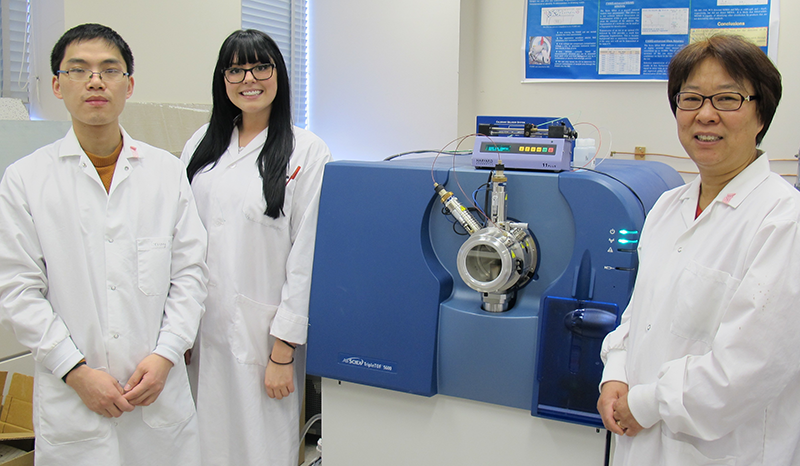
Xing-Fang Li (right) in her lab. Guang Huang (left), postdoctoral fellow, and Lindsay Blackstock (Jmaiff), PhD student, are also part of her research team.
The quality of our drinking water meets high standards to ensure the protection of the population. However, the work of Xing-Fang Li, from the Faculty of Medicine & Dentistry's Division of Analytical and Environmental Toxicology, could make water even safer for Canadians.
Li and Steve Hrudey, her co-principal investigator, recently received a Strategic Partnership Grant from the Natural Sciences and Engineering Research Council of Canada (NSERC). The $453,500 grant will allow them to develop their project to identify new water disinfection byproducts that could have an impact on human health.
Disinfection byproducts (DBPs) are additional substances formed as a consequence of the process of water disinfection. "We have to do disinfection to kill pathogens and save lives," says Li. "The natural organic matter in the water reacts with the disinfectant used, and it creates a large number of compounds."
Several byproducts have already been identified and proved to be safe as long as the drinking water follows the standards that determine acceptable concentrations. However, more than 70 per cent of these compounds remain unknown. Li's project to discover them could be the key to understand the possible link established in epidemiological studies between drinking chlorinated water and higher risk of developing bladder cancer and other health conditions.
According to Li, "The current regulated disinfection byproducts are important because this is how we can control that water is properly disinfected. But these regulated byproducts cannot explain the observations that epidemiological studies have reported [like the suggested bladder cancer risk], and we don't know what kind of compounds, if any, may be increasing this risk."
Finding new DBPs won't be an easy task. The grant, provided for three years of research, will help Li's team develop the analytical strategies and methodologies to identify these thousands of chemicals. Since they are present in very low concentrations it will be a challenge to confirm them; it will require additional collaboration from other colleagues within campus to decrypt all the data gathered. Li believes it is a valuable effort because, although there is no immediate danger from these byproducts, identifying these substances may have a positive impact on long-term health.
"The essential goal of my research is that we can ensure the pathogens are totally inactivated and, at the same time, we can minimize the formation of toxic compounds," explains Li. "Our drinking water is safe, but we can make it even better."
"In general water companies care and pay a lot of attention to drinking water safety and pursue a precautionary approach. However they have to operate under what we know. But despite more than 40 years of research in this subject we need a much better understanding of what health risks, if any, may be caused by disinfection byproducts."
In addition to the NSERC grant, Xing-Fang Li's work is supported by the Alberta Innovates Energy and Environmental Solutions; the Water Research Foundation (USA); the Faculty of Medicine & Dentistry; industrial collaborators like EPCOR; colleagues in the United States, and Sciex, a manufacturer of mass spectrometers utilized for the identification of the byproducts. She also gives special credit to many of her students, who have shared her interest in this subject and have joined her research team.
"They have extensive backgrounds in chemistry, engineering or microbiology. That's how my group progresses, because of their diverse contributions to the research program."
Li, a PhD from the University of British Columbia with post-doctoral training in Chemistry at the U of A, considers her students and postdoctoral fellows as her family, aside from her husband, son and daughter who also belong to the FoMD. Her 15 years of research in this subject at the faculty have been encouraged by Hrudey and her department as well.
"My colleagues in the department are wonderful. They always support. I cannot ask for more."